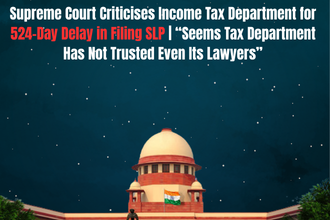In a significant ruling, the Supreme Court of India has reiterated that misguiding the Court to secure an order without any genuine intention to comply amounts to civil contempt. The judgment was delivered in the case titled M/S Chithra Woods Manors Welfare Association vs Shaji Augustine, reported as 2025 LiveLaw (SC) 480, where the Court emphasized that misuse of the judicial process threatens the integrity and efficiency of the judicial system.
The bench comprising Justice Abhay S. Oka and Justice A.G. Masih firmly held that such conduct, where a party abuses the court’s trust to gain favorable orders but fails to act upon them, cannot be tolerated and must be punished.
Case Background
The case traces its roots back to a licensing agreement signed in 2014 for a property in Munnar, Kerala. The Respondent defaulted on the agreed payments, leading to prolonged litigation, arbitration proceedings, and eventually, a settlement agreement in 2017.
In 2022, during proceedings before the Supreme Court, the Respondent undertook to pay an amount of Rs. 172 lakhs in six monthly installments. Based on this solemn undertaking, the Supreme Court passed an order recording the commitment. However, the Respondent failed to honor his promise, prompting the Petitioner to initiate contempt proceedings.
Supreme Court’s Observations
The Supreme Court, after considering the facts, found the Respondent guilty of civil contempt for misleading the Court.
The Court noted:
“A party, misguiding the Court to pass an order which was never intended to be complied with, would constitute an act of overawing the due process of law and, thus, commit contempt of Court.”
The bench observed that from the very beginning, the Respondent had been attempting to manipulate and misuse the Court process to his advantage, only to subsequently ignore his commitments. Such behavior, the Court said, threatens not just the image of the judiciary but also its very functioning.
Contempt of Court: A Necessary Punishment
The Court rejected the Respondent’s plea of financial difficulties, emphasizing that:
“The misuse of the process of Court with an intent to tarnish the image of judiciary, threatening the integrity, and the efficiency of the judicial system cannot be allowed to be overlooked and ignored in the garb of non-fulfilment of the directions because of now said to be faced financial constraints.”
Highlighting the gravity of the misconduct, the Court ruled that mere imposition of a fine would not suffice in this case. It was necessary to impose a punishment that would serve as a deterrent and uphold the sanctity of Court orders.
Accordingly, the Supreme Court sentenced the Respondent to three months of simple imprisonment and imposed a fine of Rs. 20,000. The Court also granted a 30-day window for compliance, failing which the sentence would be enforced.
Importance of Compliance With Court Orders
The Supreme Court’s ruling underscores a vital principle: an undertaking given to a court is not a mere formality; it carries the weight of an assurance made to the highest authority in the land. Flouting such undertakings strikes at the very root of judicial credibility and the rule of law.
This decision serves as a stern warning to litigants that the judicial process cannot be taken lightly. Courts operate on the fundamental assumption of good faith. When a party misleads the Court, it endangers not just the outcome of an individual case but the entire judicial ecosystem.
Broader Legal Implications
This judgment also throws light on several important legal principles:
- Misrepresentation before the Court is a grave offense.
- Non-compliance with an undertaking amounts to contempt.
- Financial inability, when artificially claimed to escape obligations voluntarily undertaken, will not be entertained as a valid defense.
- The Court has discretion to impose punitive sentences including imprisonment for civil contempt when warranted by the facts.
The case affirms that courts are guardians of the law and must act firmly when their authority is undermined.
Related Developments
The ruling aligns with other recent decisions by the Supreme Court reinforcing judicial discipline:
- In Govt. of India vs. Bafna Group, the Court emphasized the limited scope of judicial interference in tender matters, reiterating that mala fide or arbitrariness must be proved.
- In XYZ vs. ABC Bank, the Court held that FIRs against borrowers can continue even if their classification as “fraudulent” is overturned on technical grounds.
- In Service Dispute Case, the Court ruled that a time-barred grievance cannot be revived through a belated representation.
Together, these decisions point towards the Supreme Court’s intent to preserve the integrity of the legal process against misuse and dilatory tactics.
Conclusion
The Supreme Court’s ruling in M/S Chithra Woods Manors Welfare Association vs Shaji Augustine sends a clear and strong message: Misguiding courts and failing to respect court orders will attract serious consequences. Courts must be treated with the utmost respect and any abuse of judicial process will not go unpunished.
The decision strengthens public confidence in the judiciary and reaffirms that law will not tolerate dishonesty, whether inside the courtroom or outside.
In a time when the judicial system is burdened with numerous cases, maintaining trust and ensuring compliance with court orders is crucial. The ruling ensures that the majesty of law remains intact and that parties approach the court with sincerity and integrity.


